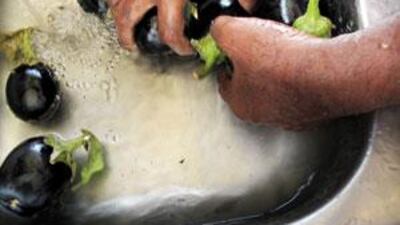ABU DHABI // A campaign to install water-saving devices in homes in Abu Dhabi's Tourist Club area will kick off next week, officials said yesterday. The initiative, which could spread throughout Abu Dhabi in the next three years, is a step to reduce the emirate's water use, which is among the highest in the world.
Beginning on Thursday, 30,000 households in the capital will be covered within the next year. The campaign, Watersavers, will also include 15,000 households in Al Ain and another 10,000 in Al Gharbia. The Dh13 million (US$3.5m) bill is being footed by the Government. The devices and visits to install them cost residents nothing. "All we are asking people to do is open their doors and let the installation teams in," said Dr Mohamed Dawoud, water resources scientist and manager at the Environment Agency - Abu Dhabi (EAD), which is behind the initiative.
"Each household visit will last a few minutes." The installation process was simple and the teams, who would make their rounds during the evening, would wear special uniforms and carry identification papers, Mr Dawoud said. The Government is spending another Dh7m on explaining the campaign, with a call centre and a website, www.watersavers.ae. The devices that will be installed are simple. One, an aerator, will be installed on taps. It consists of an rubber gasket and internal mesh, which water coming out of the tap with air so the flow is reduced by half. Because the air in the flow was under pressure, the sensation for users was the same, the campaign team said. Showers will be fitted with regulators, which operate on a similar principle.
Each household could save as much as Dh100 per month, Dr Dawoud said. Although the amount may seem trivial, the programme's potential to reduce government spending on water is significant - Dh65m per year. If the devices are installed in all of Abu Dhabi's households, the savings could reach Dh300m per year. The scheme could save 75 billion litres of water per year, the equivalent of 35,000 Olympic-size swimming pools. Abu Dhabi's residents use on average 550 litres of water per day.
"We use three times the global benchmark standard set by the United Nations," said Majid al Mansouri, EAD's secretary general. If that remains unchanged and the population continues to grow, Abu Dhabi could face water shortages as soon as 2012. The emirate now relies on desalination, an energy-intensive process in which the minerals dissolved in seawater are removed, to provide for all its domestic water supply.
"It would be easy if the answer was to build more desalination plants. However, this is not the answer," said Dr Dawoud. "If we build more desalination plants, we would increase our carbon footprint." The UAE already has one of the highest per capita carbon footprints in the world - each person here contributes to climate change more compared to people living in most other countries. In addition to contributing to climate change, desalination, through the discharge of hypersaline or hot brine from plants, can hurt coral, sea grass and other creatures that live in the ocean. While the campaign's potential to save water is important, some experts have argued that focusing on users with particularly high water consumption could have a greater impact.
According to the Abu Dhabi Water Resources Master Plan, published by EAD last year, water use varies significantly, depending on where a person lives. Flat residents use 170 to 200 litres per capita per day, comparable to the average in developing countries. However, villa owners use between 270 and 1,760 litres per person per day. This means that a lot of water is used in swimming pools, to wash cars and clean villa grounds.
Water is also significantly undervalued. Although it costs Dh25 to produce 1,000 gallons of water, expatriate residents in Abu Dhabi pay Dh10. UAE nationals are exempt from charges. Some have argued that water use will continue to be high unless more realistic pricing schemes are introduced. Meanwhile, Razan al Mubarak, the managing director of the Emirates Wildlife Society, which is working in association with the World Wide Fund for Nature, appealed for people to consider the environmental consequences of their actions.
"Their [water-saving] devices will be even more effective when our behaviour complements them," she said. Besides private residences, the installation campaign will also cover 2,750 mosques, more than 500 schools and 2,000 public buildings. Once the water-saving devices have been installed, officials will review the actual savings realised and the Abu Dhabi Government would decide whether to roll out the initiative across the entire emirate, said Dr Dawoud.
"We can cover the whole of Abu Dhabi within three years," he said. @Email:vtodorova@thenational.ae

